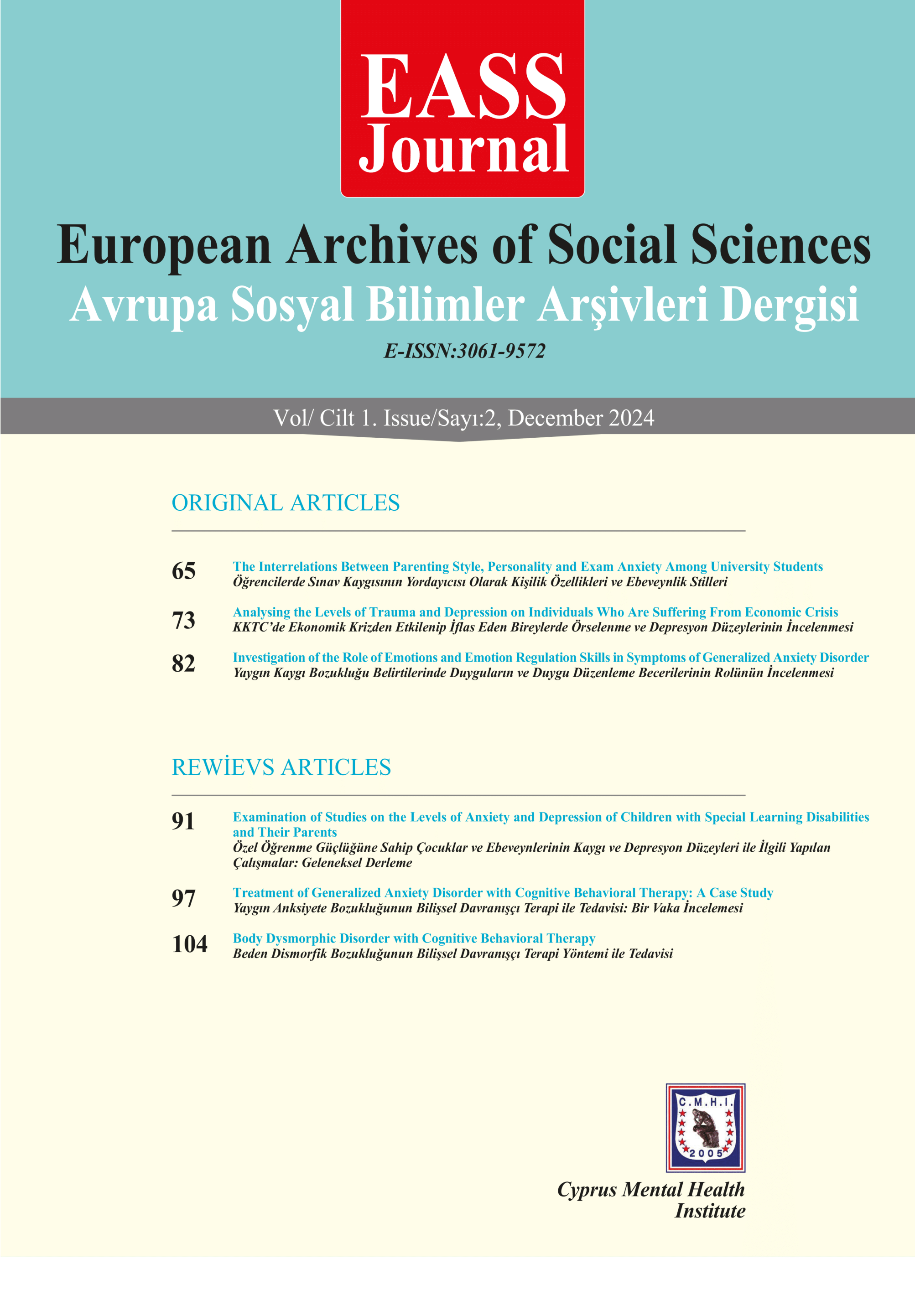PERSONALITY TRAITS AND PARENTING STYLES AS PREDICTORS OF EXAMINATION ANXIETY AMONG STUDENTS
DOI:
https://doi.org/10.35365/eass.24.2.01Keywords:
test anxiety, parenting behavior, parent child relations, personality, academic performance, university studentsAbstract
Examination anxiety is a key factor influencing academic performance as well as future trajectories of students. This study aimed to examine the relationship between personality traits, parenting styles, and examination anxiety among students. A sample of 400 students was surveyed from Igbariam Nigeria with the convenience sampling technique. Three instruments were used in the study namely; the personality inventory scale, parenting style inventory, and examination anxiety scale. The results show that both parenting styles and personality traits predict exam anxiety. Lower openness to experience and conscientiousness as well as higher extraversion, agreeableness, and neuroticism predict increased test anxiety. Openness to experience and conscientiousness are associated with creativity adaptability, self-discipline, and efficiency which are likely to increase exam preparedness and test-wiseness. On the other hand, parenting styles with elevated parental responsiveness and demandingness; and lower autonomy granting predicted higher exam anxiety. Access to course material and the utilization of external learning resources were linked to reduced exam anxiety. Parenting styles and the personality traits of the offspring were revealed to have a reciprocal causal relationship. The study suggests that learning should be more student-focused to foster more student engagement which is linked to less exam anxiety and better academic performance.
References
References
Alghamdi, A. R. (2016). Test anxiety: Concept and implication. IOSR Journal of Nursing and Health Sciences, 3(3), 112-113. doi: 10.9790/1959-050303112115
Asghari, A., Kadir, R. A., Elias, H., & Baba, M. (2012). Test anxiety and its related concepts: A brief review. Educational Sciences and Psychology, 3(22), 3-8
Boulton, M. J. &Macaulay, P. J. R. (2022). Parenting about challenges and adolescents' social anxiety, disrupted classroom concentration, and resilience knowledge: The mediating role of authentic self-esteem. National Library of Medicine/PubMed, 40(3):332-342. doi: 10.1037/fsh0000701
Cassady, J. C., & Johnson, R. E. (2018). Cognitive test anxiety and academic performance. Contemporary Educational Psychology, 53, 123-133. https://doi.org/10.1006/ceps.2001.1094
Cavanagh, S. R., Spence, S. H., & Donovan, C. L. (2017). The development of a measure of the neurobiological underpinnings of test anxiety: The Test Anxiety Inventory for Neurobiological Substrates (TAI-NS). Personality and Individual Differences, 104, 59-64.
Costa, P. T., & McCrae, R. R. (2012). Revised NEO Personality Inventory (NEO-PI-R) and NEO Five-Factor Inventory (NEO-FFI) professional manual. Psychological Assessment Resources
Darling N., Toyokawa T. (1997). Construction and validation of the parenting style inventory II (PSI-II). Available online at http://www.oberlin.edu/faculty/ndarling/lab/psiii.pdf
Deighton, J., Humphrey, N., Belsky, J., Boehnke, J., Vostanis, P & Patalay, P. (2018). Longitudinal pathways between mental health difficulties and academic performance during middle childhood and early adolescence. British Journal of Developmental Psychology, 36(1), 110–126. doi: 10.1111/bjdp.12218
Del Aguila, E., Martínez, J.R., Pablos, J.L., Huánuco, M., Encina, V., & Rhenals, A.L. (2020). personality traits, anxiety, and self-esteem in patients seeking cosmetic surgery in Mexico city. Plastic and Reconstructive Surgery Global Open, 7(10), doi: 10.1097/GOX.0000000000002381
Evans, D., Gaysina, D. & Field, A. P. (2020). Internalizing symptoms and working memory as predictors of mathematical attainment trajectories across the primary-secondary education transition. Royal Society Open Science, 7(5), 191-433. doi: 10.1098/rsos.191433
Gramstad, T.O., Gjestad, R., & Haver, B. (2020). Personality traits predict job stress, depression and anxiety among junior physicians. BMC Medical Education, 13, 150-150
Hale, W.W 3rd, Engels R, Meeus W. (2006). Adolescent's perceptions of parenting behaviours and its relationship to adolescent Generalized Anxiety Disorder symptoms. J Adolescent, 29(3):407-17. doi: 10.1016/j
Holochwost, S. J., Volpe, V. V., Iruka, I. U., & Mills-Koonce, W. R. (2020). Maternal warmth, intrusiveness, and executive functions in early childhood: Tracing developmental processes among African American children. Early Child Development and Care, 190(2), 210-218. https://doi.org/10.1080/03004430.2018.1461096
Kjeldsen, A., Nes, R. B., Sanson, A., Ystrom, E. & Karevold, E. B. (2021). Understanding trajectories of externalizing problems: Stability and emergence of risk factors from infancy to middle adolescence. Development and Psychopathology, 33(1), 264-283. doi: 10.1017/S0954579419001755.
Kukso, O., & Kukso, P. A. (2022). Characteristics of physiological indicators and individual personality characteristics of students under exam stress. Psychology and Psychothecnics, 1(2), 54-68. doi: 10.7256/2454-0722.2022.2.36529
Latas, M., Pantić, M., & Obradović, D. (2010). Analysis of test anxiety in medical students. Med Pregl, 63(11-12):863-866. doi: 10.2298/mpns1012863l.
Lim, R. P. & Ortiz-bance, L. (2013). Personality Traits as Predictors of Test Anxiety Level of Students with Learning Difficulties. The Trinitian Researcher, 5(1).
McCrae, R. R., & Costa, P.T. Jr. (1997). Personality trait structure as a human universal. American Psychologist. 52(5), 509-516. doi: 10.1037//0003-066x.52.5.509
Olanrewaju, M. & Adeoye, H. (2020) Influence of gender and mode of study on examination anxiety among University undergraduates of Ogun State. Integrity Journal of Education and Training, 2(3) 15-20 https://doi.org/10.31248/IJET2018.026
Saunders, M., Lewis, P. & Thornhill, A. (2012). Research Methods for Business Students (6th ed.). Pearson Education Limited
Sawka-Miller, K.D. (2011). Test Anxiety. In: Goldstein, S., Naglieri, J.A. (eds) Encyclopedia of Child Behavior and Development. Springer, https://doi.org/10.1007/978-0-387-79061-9_2890
Shete, A., Shete, A., Dube, S., & Dubewar, A. (2020). Sample size calculation in bio-statistics with special reference to unknown population. International Journal for Innovative Research in Multidisciplinary Field, 6(7), 236-238. https://www.ijirmf.com/wpcontent/uploads/IJIRMF202007001.pd
Spielberger, C. D. (1980). The Test Anxiety Inventory. Consulting Psychologist Press Inc
Srivastava, S. (2008) Measuring the Big Five Personality Factors. Available online at http://www.uoregon.edu/~sanjay/bigfive.html
Theobald, M., Breitwieser, J., Brod, G. (2022). Test Anxiety Does Not Predict Exam Performance When Knowledge Is Controlled For: Strong Evidence Against the Interference Hypothesis of Test Anxiety. Psychology Sci, 33(12):2073-2083. doi: 10.1177/09567976221119391
Van Schie, C., Cook, J. L., Bernet, E., & Verena, L. (2023). A boost in self-esteem after positive social evaluation predicts social and non-social learning. R. Soc. Open Sci, 10. Doi.org/10.1098/rsos.230027
Downloads
Published
How to Cite
Issue
Section
License
Copyright (c) 2024 CHINWEDU ENECHI, Gloria Manyeruke

This work is licensed under a Creative Commons Attribution 4.0 International License.









 The journal is licensed under a
The journal is licensed under a 